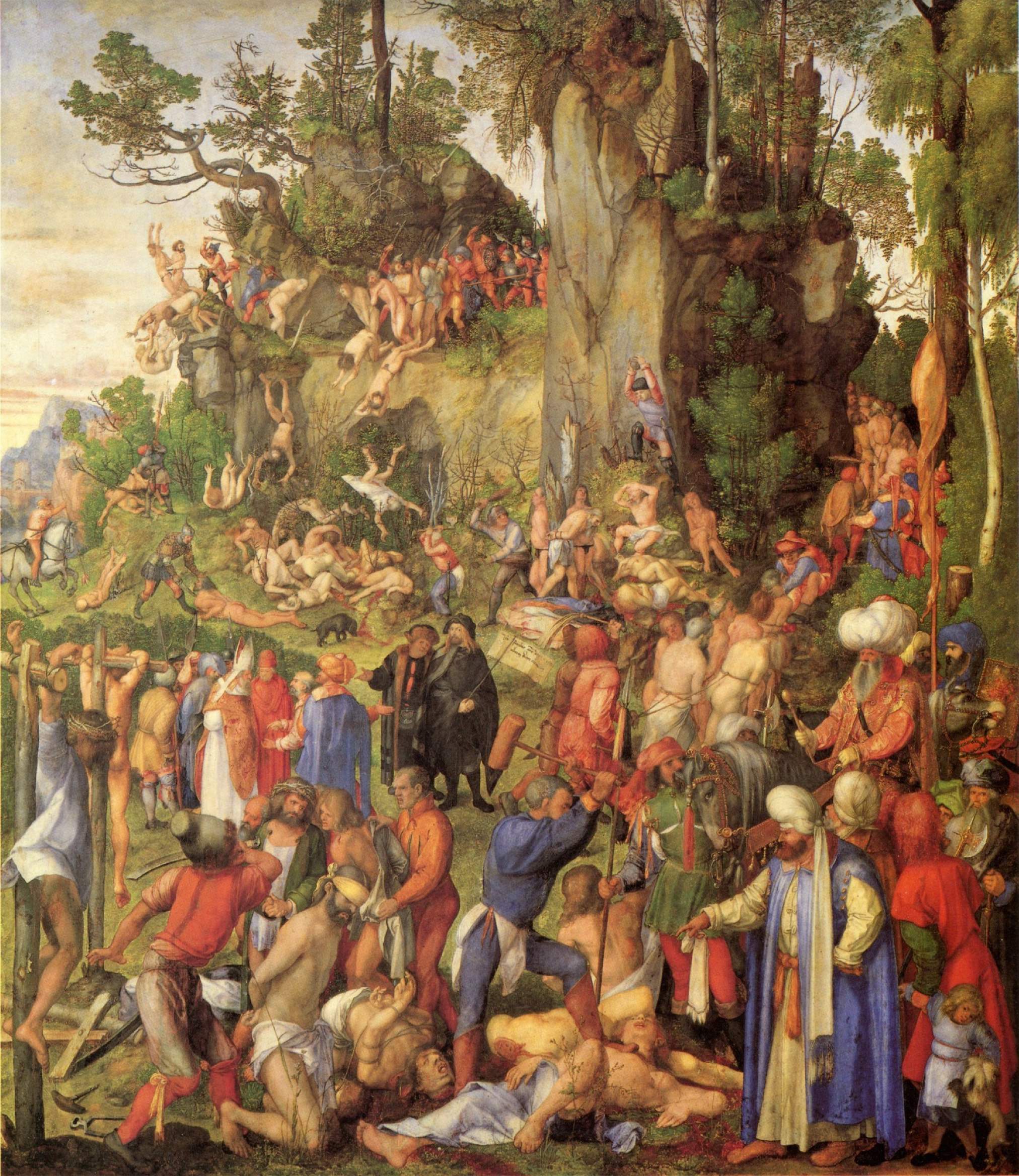
Hawkins / Negativitaet
(umgeleitet von Hawkins.Negativität)
Inhaltsverzeichnis: (verbergen)
|
Befolge die traditionelle Weisheit, die empfiehlt, das Böse nicht zu fürchten oder zu bekämpfen, sondern es einfach zu meiden. |
|
Man wird auch mit den Mächten konfrontiert, welche die "dunkle Seite" der Bewusstseins- |
|
Was sich unter dem BW 200 bewegt, schwingt im negativen, unlauteren Bereich. Das Negative ist die Nicht-Anwesenheit des Guten. Es ist un-wirklich und schwingt in der illusionären Nicht-Existenz.
Laut ⚡ Hawkins sind die Haltung und die Taten von nur 2,6% der "bösen"1 Menschen mit einem extrem niedrigen Be-wusstseinsniveau für 72% der Destruktivität der gesamten Menschheit verantwortlich.
 Marter der zehntausend Christen, 1507 Albrecht Dürer (1471-1528) deutscher Maler Im Jahr 2007 befanden sich 85% der Menschheit unter der Bewusst-
Der evangelisch-reformierte Theologe Karl Barth (1886-1968) aus der Schweiz erklärte, es gäbe für das Theodizee3-Problem keine Lösung. Laut Barth ist der Mensch nicht dazu berechtigt, Gott anzu-
Zu glauben, dass das menschliche Leiden jedoch von Gott komme, ist laut Hawkins und ⚡ Ein Kurs in Wundern4 ein spiritueller Fehler, dem Hawkins selbst aufgesessen war, was ihn jahrzehntelang zum Atheisten machte5.
Nach dem Gesetz der Resonanz werden beim Menschen jene unerlösten seelischen Aspekte und Themen ebenfalls im Außen sichtbar und erfahrbar. Es gibt sowohl das nach Außen projizierte Ungeliebte als auch das wirklich-unwirkliche Böse in der Welt, das sich als zwangsbasierte Macht (Dominationsmacht) – Wesenheiten, welche die Wahrheit ausgeschlagen haben, ausdrückt.
Dieser Umstand drückt ein karmisches Einverständnis des Menschen aus, diesen Kräften ausgeliefert zu sein und von
Übersinnliche Angriffe – auch in körperlich spürbarer Ausführung – erfahren spirituelle Aspiranten und Menschen guten Willens an ihren jeweiligen Schwachstellen, da sie für die fortgesetzte Dominanz negativ gepolter Bewusstseinsfelder auf Erden gefährlich geworden sind. |
| Siehe dazu [*]: ►Grafik Negative Attraktorfelder und deren Einfluss auf das Chakrasystem |
| ||||||||||||||||||||||||||||||||||||||||||||||||
|
Hawkins betrachtet das 'Böse' in rekontextualiserter Weise. Naturkatastrophen und Krankheiten, als auch die Unumgäng-
Natur"katastrophen" sind weder bösen Ursprungs noch eine auferlegte Strafe von Gott. Diese Überzeugungen basieren auf einer verzerrten Wahrnehmung der Realität. Es ist der fehlende Kontext von Karma, der zu einer solchen Kategorisie-
Hawkins unterscheidet zwei Kategorien des "Bösen"6: |
| Referenz: de.Wikipedia-Eintrag ► Das Böse |
|
Buddha berichtet davon, wie er von Dämonen angegriffen wurde. |
BW 175 – BW 199 / Ebene 175-199: Stolz |
|
Luziferische Kräfte
|
BW 1 – BW 174 |
|
Satanische Kräfte
|
BW-Bereich unter BW 50 |
|
Dämonische Kräfte
|

Ersteller der Grafik: elb, ehemaliger Spiritualwiki-Beitragender
|
Politische und gesellschaftliche Standpunkte, welche das Attraktorfeld von Stolz widerspiegeln, schwingen auf BW 190,
Fallbeschreibung eines zeitweise Besessenen auf zwei BW-Ebenen:
Attackenreiter, die von luziferischen oder satanischen Kräften beeinflusst und überschattet werden, entlarven sich:
|
Angriff aus feinstoffliche Ebenen
Freuds Modell des Es, Ichs, Über-Ichs graphische Darstellung; Das "Id" (wörtlich ES) ist der dem Lustprinzip folgende primitiv denkende Teil des Ich-Komplexes.
People of the Lie. The Hope for Healing Human Evil [LoC 450] Touchstone Press, 1st edition 1983, 2nd edition 2. January 1998
Alban Butler (1710-1773) English Roman Catholic priest, hagiographer, The Lives of the Fathers, Martyrs and Other Principal Saints, the result of thirty years study, four volumes, London, 1756-1759, Kessinger Publishing, 26. May 2006
Dealing with one's own Shadow side
Recontextualizing the human condition expressed as inconsiderate behavior
Love [LoC 500+] containing openness and vulnerability
Fault register work by David R. Hawkins – Taking 100% responsibility

| Source: ► ⚡ David Hawkins, Sedona Seminar Emotions and Sensations, DVD 1 of 3, minute 43:00 "Fault Register", Arizona, 17. April 2004 |
| See also: ► Forgiving |
Matthäus 10, 25; Mt 12, 24,27; Lukas 11,15 18-19
Persönliche Bekenntnisse
Schlussfolgerungen
Einsichten
Das Böse wirkt durch unbewusste Menschen, die es versäumen, ihre Schöpferkraft in Anspruch zu nehmen.
Theodizee-Paradoxon9
Barth führt aus, dass der Mensch nicht dazu berechtigt sei, Gott hinsichtlich der Existenz des Bösen anzuklagen.
Diese Aussage wurde Albert Einstein [BW 499] (1879-1955) zufolge einer Internetente zugesprochen.
Der Sturz der Rebellenengel in die Hölle William Blake (1757-1827) englischer Maler
|
|
Literaturzitate
| Wenn das Böse dir gegenüber steht, dann schau ihm fest ins Auge. Schaue solange hin, bis du im Spiegel der Augen deines Feindes dein eigenes Böses erkennen kannst. Und dann ziehe dich zurück. Und schaue deinem eigenen Bösen fest ins Auge. Schaue solange hin, bis du hinter ihm dein verletztes Gutes erkennen kannst. Dann schließe sie beide, das verletzte Gute und das verteidigende Böse so fest in die Arme deines Herzens wie du kannst und kümmere dich nicht um den Feind. Danke ihm im Stillen und lass ihn seine Wege gehen. Sie werden die deinen nicht mehr kreuzen. Solange du jedoch im Bewusstsein deines Rechts verharrst, wird dein Feind dein Feind bleiben. |
| Quelle: ► Safi Nidiaye (*1951) deutsche Meditationslehrerin, Zeitschriften- und Fernsehjournalistin, Dichterin, Schriftstellerin, Die Stimme des Herzens. Der Weg zum größten aller Geheimnisse, Bastei Lübbe, 9. Auflage 25. April 2000 |
| Siehe auch: ► Verletzlichkeit und ► Spiegel |
Article Demons in the Bible, compiled and edited by BibleStudyTools, 20. July 2018
When faced with spiritual struggle/battle against the "dark world"
and the "forces of evil", the armor of God includes a "belt of truth" and a "shield of faith".
Personal avowals
Recommendations
Revolutionary Psychology, chapter 1 "The Level of Being"
Appeal
Questions
Warning – Caveat
Conclusions
Insights
|

|
[Paraphrased variant] Fairy tales are more than true – not because they tell us dragons exist, but because they tell us dragons can be beaten.
|
|
Literary quotes
Poem
|
Google's motto: Don't be evil. |
Note: Google, an outlet of the Pentagon from start, turned to evil, turned AI.
Google officially dropped the above motto in its 2015 restructuring.
Personal avowals
Conclusion
M. Scott Peck examined group evil, discussing how human group morality is strikingly less than individual morality.
This is partly the result of specialization, which allows people to avoid individual responsibility and pass the buck,
resulting in a reduction of group conscience.
Peck's analysis of the My Lai Massacre reduces group evil to a manifestation of conscienceless behavior brought
about by individual laziness and narcissism. Peck calls for the constitution of a genuine psychology of evil.
ONE person only willing to alert to genocide and psychopathology
Using the My Lai Massacre as a case study M. Scott Peck also examines group evil, discussing how human group morality is strikingly less than individual morality. Partly he considers this to be a result of specialization, which allows people to avoid
individual responsibility and pass the buck, resulting in a reduction of group conscience.
M. Scott Peck (1936-2005) US American psychiatrist, psychotherapist, author, Biographical Information, People of the Lie. The Hope for Healing Human Evil, chapter 6 "My Lai. An Examination of Group Evil", Touchstone Press, 1st edition 1983, 2nd edition
2. January 1998
| References: ► Book review by Barton Knapp, People of the Lie: The Hope for Healing Human Evil, presented by the independent scientific SAGE Journal, first published 1. April 1984 ► Blogspot by Arthur Silber, The Culture of the Lie, III: Creating Hell on Earth, 29. June 2006 ► Article My Lai, Sexual Assault and the Black Blouse Girl: Forty-Five Years Later, One of America’s Most Iconic Photos Hides Truth in Plain Sight, Valerie Wieskamp, 29. October 2013 |
| References: en.Wikipedia entries ► My Lai Massacre and ► M. Scott Peck |
| See also: ► Key phrases describing the hyperdimensional cultural psychosis spanning ages ► Conflict and ► Conscience and ► Narcissism |
| |||||||||||||||||||||||||||||||||||||||||||||||||||||||||||||||
| Reference: ► Five types of clusterings in companies and society – David Logan |
| See also: ► Philosophies ► Models of leadership, value creation and democracy – Richard Barrett ► Appeasing the demons – as practiced by Tsultrim Allione ► Levels of consciousness |
In 1963 the German-Jewish political theorist Hannah Arendt published her book Eichmann in Jerusalem. A Report on the Banality of Evil, based on the trial of Adolf Eichmann in Jerusalem.
Eichmann was a top administrator in the machinery of the Nazi death camps. Arendt's concept of the banality of evil be-
came popular then. She posited that people who carry out abominable crimes may not be crazy fanatics, but rather ordinary
individuals who accept the premises of their state and participate in ongoing enterprises with the energy of unscrupulous bureaucrats.
|
Stanley Milgram's experiment:
Milgram's experiment confirmed Hannah Arendt's Banality of Evil conclusion in view of Adolf Eichmann's trial in Nuremberg. Evildoers are not monsters, they are rather like the next door neighbor. Before Milgram Ahrendt had concluded: Given certain circumstances ordinary people will place obedience to authority ( "I was just following orders.") above their |
|
In 1971 US American professor of psychology Philip G. Zimbardo at Stanford University, a high school class mate of Stan-
Zimbardo's final conclusion:
| ||||||||||||
|
In 2002, Alexander Haslam and Stephen Reicher, both social psychologists revisited Zimbardo's plot in a BBC funded television documentary series The Experiment in 2002. The project, lasting for 8 days, simulated a prison situation. This time the prisoners and the guards were left to their own choices – under the set conditions. The experimenters found:
After this ALL participants agreed, without much ado, to form a system of greater equality: they termed this a ‘self-governing, self-disciplining commune’.
Some of the former guards and prisoners planned a new 'coup' to re-establish the gap between prisoners and guards, and return to the more authoritarian style.
Prisoners who had successfully bonded formed a commune with the former guards. Alongside with the guards they had |
|
| See also: ► The Pygmalion effect – Average people may perform at genius level. |
| See also: ► Language and ► Statistics |
Englisch
Englische Werke
Links zum Thema Negativität und das Böse / Negativity and evilLiteratur
Politische Ponerologie beschreibt die Natur des Bösen in schockierender Weise, analysiert die Gründer und Unterstützer von politisch unter-
Literature (engl.)
Exploring the frightening needs of diverse social groups, looking into the deep inner fears of man
Thurston County ritual abuse case, 1994), about the "false memory" of Paul Ingram, 7. June 1996. Wright testified at Ingram's pardon hearing.
'Political Ponerology' offers shocking descriptions of the nature of evil, inspects the founders and supporters of oppressive political regimes, and analyses the propagation of man's inhumanity to man.
Foreword: My search to understand evil and its transformation is what attracted me to Paul Levy’s invaluable work. […] In helping us understand
Young pornography consuming men are suffering from a new form of "arousal addiction" – countermeasures for getting them back on track
Externe Weblinks
Der Psychologieprofessor Roy Baumeister, Florida State University in Tallahassee, unterscheidet vier Wurzeln des Bösen:
Durch die Intervention seiner Kollegin und späteren Ehefrau Christina Maslach, emeritierte Professorin für Psychologie an der University of California in Berkeley, wurde der Zug des "angeteufelten" Zimbardo angehalten und das Stanford Prison Experiment frühzeitig nach sechs Tagen abgebrochen.
Die "dunkle Triade" sozial unerwünschter Charaktereigenschaften – Gewinnsucht, Narzissmus und psychopathische Kaltherzigkeit –
Gelöschte Links
Weblinks zum Thema Negativität – QuoraBeiträge verfasst von Elfriede Ammann, präsentiert auf der kalifornischen Frage-und-Antwort Webseite Quora DE
External web links (engl.)
1. We lie.
Audio- und Videolinks
Der Mensch ist. Er ist weder gut noch böse. Er ist aber der Liebe bedürftig und zum Hass befähigt. Das "Böse" ist immer reaktiv, Folge von…
Audio and video links (engl.)
Negativity and the need to fill the hole in one's heart daily (part III)
Discussing Lobaczewski's book Political Ponerology
Audio and video links (engl.) – Philip Zimbardo and Milgram
Evil is not so much inherent in individuals, but emerges dependably when a sequence of dehumanizing and stressful circumstances unfolds.
Excerpted from The Evilness of Power, showing that much evil comes from hierarchy
Compare to:
See also: en.Wikipedia Milgram experiment
Documentaries and movies
Testing the dark side of authority-obedience: Milgram experiment and other harm-inducing human behavior experiments; Stanley Milgram (1933-1984) US American social psychologist: "Under what conditions would a person obey authority who commanded actions that went against conscience?" Minute 4:18
|
Wiki-Ebene
1 "Evil is whatever you define it as." D. Hawkins, Cottonwood Satsang Q&A, 2 CD-Set, 10. Februar 2010 ⇑
2 Reality, Spirituality and Modern Man, Kapitel 2, S. 55, 2008 ⇑
3 Altgriechisch für "Rechtfertigung Gottes" ⇑
4 "Nichts Wirkliches kann bedroht werden. Nichts Unwirkliches existiert. Hierin liegt der Frieden Gottes." Ein Kurs in Wundern [EKiW] Textbuch [BW 550], Einleitung, S. 1, 1994, 1996 ⇑
5 Nachzulesen unter Biografie – Tiefgreifende Erlebnisse in jungen Jahren ⇑
6 Prescott Seminar Freedom. Morality and Ethics, 3 DVD-Set, 8. November 2008 ⇑
7 Fallen und Versuchungen auf dem spirituellen Weg ⇑
8 Truth vs. Falsehood. How to Tell the Difference, S. 367, 2005 ⇑
9 Altgriechisch für "Rechtfertigung Gottes" ⇑
10 Sedona Seminar Witnessing and Observing, 16. October 2004 ⇑
11 Truth vs. Falsehood. How to Tell the Difference, chapter 11 "The Downside of Society", S. 193, 2005 ⇑
12 Sedona Seminar Witnessing and Observing, 16. October 2004 ⇑